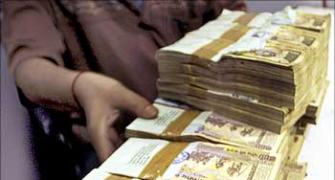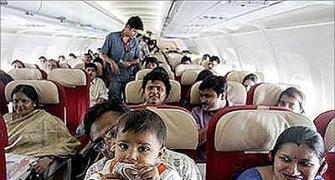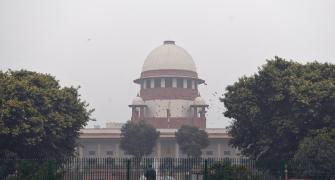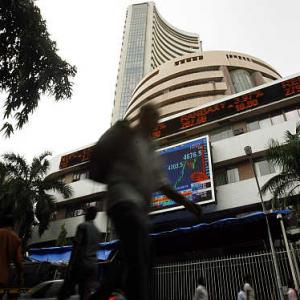 The Indian economy has at least another year of poor-quality economic growth ahead of it, even if the pace of expansion is somewhat faster than the 5.5 per cent expected for 2012.
The Indian economy has at least another year of poor-quality economic growth ahead of it, even if the pace of expansion is somewhat faster than the 5.5 per cent expected for 2012.The quality of growth will disappoint because a much-needed pickup in investment is not yet on the horizon. The credit cycle is still weak; state-owned banks are hobbled by bad loans. For investors, it means cash-rich consumer goods makers may be superior bets in 2013 than credit-dependent infrastructure and capital goods companies.
Consumption will remain well supported by strong rural wage growth and government subsidies on food, fuel and fertilisers. Despite all the talk about the urgency of fiscal consolidation in India, public spending will remain high, as it tends to do in pre-poll years. And that will put more cash in people's wallets.
Domestic consumption will also get a boost from an improvement in exports. Global demand conditions will probably not deteriorate any further in 2013, and that will drive a steady recovery in India's manufacturing output, leading to job creation and wage growth. The surge in industrial production in October is a welcome signal.
Spending power will increase in real terms as inflation stops being as big a drag on consumer sentiment as it has been this year. The pace of rising prices won't fall as low as five per cent, but it will decelerate from its current 10 per cent assuming oil prices don't spike.
Fears of a sudden demand collapse in the United States from large, abrupt cuts in government spending and tax increases are keeping oil prices in check; and that helps a large energy importer like India. Even then, if the US economy does jump off the "fiscal cliff," or if the sovereign-debt worries in Europe resume, heightened risk aversion among global investors will choke capital flows to India, and that will be bad news for an economy addicted to overseas funding.
Assuming a more benign outcome for the US and European economies, India's GDP growth should accelerate by about a percentage point in 2013. A revival in leveraged consumption will play an important part. The share of retail loans in GDP is yet to revert to its 2008 peak. High interest rates have discouraged individual borrowers over the past couple of years. As domestic interest rates start easing off, there will be a recovery.
Banks will also be keen to write loans for automobile and white goods purchases next year because households are in better financial shape than corporate borrowers, whose balance sheets are still clogged by the wreckage of a previous credit binge. Morgan Stanley is forecasting 18 per cent
growth in bank loans to retail customers next year. If that happens, auto sales - which are currently stagnant - should again see double-digit growth by the end of 2013.
All of this suggests that betting on India's private consumption may be a more profitable trade for investors than hoping for a revival in capital expenditure.
An MSCI index of consumer discretionary stocks in India has risen fivefold in four years. These shares are now trading much higher than at the peak of the bubble market in early 2008. Meanwhile, shares of Larsen & Toubro, India's largest construction company and a proxy for investment demand in the economy, are languishing a fifth below their January 2008 level. Those of Jaiprakash Associates, a large infrastructure company, have slumped to a third of their peak value.
It's too early to bet on a reversal of fortunes. Order books of capital goods manufacturers are still in the doldrums as projects remain stuck for want of regulatory clearances: a property development project in Mumbai needs more than 50 separate government approvals. The creation of a Cabinet committee on investment, announced last week, is a welcome first step. The committee will be headed by the prime minister and may over time become a force for good.
But in the short run the panel will be handicapped by its inability to override individual ministries, where the delays occur.
The central bank will trim its policy rate in the first quarter of 2013, but that won't make a big difference to corporate credit demand and supply, especially in the infrastructure industry. In the absence of a well-functioning corporate bond market, banks have already built a huge exposure to infrastructure, the bulk of which is performing poorly. Lenders don't have the appetite to finance more roads.
Banks may be able to raise the equity they need to begin a new lending cycle. But a bigger worry is that the government will continue to squeeze out the private sector in the market for the nation's savings. About 70 per cent of gross household financial savings in 2013 will go towards financing the combined budget deficits of federal and state governments. This will keep the cost of capital high for companies, discouraging many of them from undertaking new projects and tempting some to borrow overseas, taking on currency risk.
Private investment will only revive meaningfully in 2014, after general elections are out of the way and fiscal consolidation begins in right earnest. However, if the polls lead to an unstable government in New Delhi, all bets will be off.
The writer is the Asia economics columnist at Reuters Breakingviews in Singapore. These views are his own










